Key takeaways:
- Understanding visa options involves navigating complex categories, each with unique requirements that can significantly impact your opportunities abroad.
- The application process demands meticulous preparation and organization, highlighting the importance of detailed documentation and meeting deadlines.
- Common challenges include overwhelming paperwork, inconsistent processing times, and the pressure of interviews, which require preparation and authenticity.
- Utilizing resources like online forums, local workshops, and official government websites can provide valuable support and clarity throughout the visa application journey.
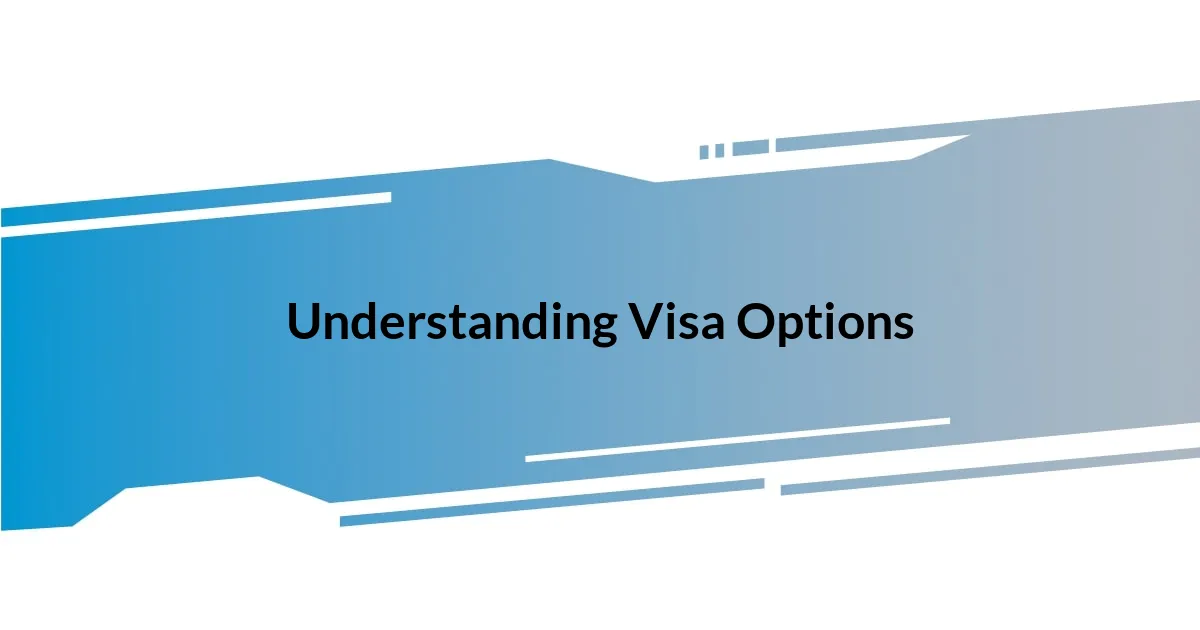
Understanding Visa Options
When I first started considering visa options, I felt a mix of excitement and anxiety. It’s such a complex landscape, isn’t it? From student visas to work permits, each type has its own set of rules and requirements—sometimes it feels like learning a new language.
One of the most eye-opening experiences for me was discovering how specific visa categories can open doors to incredible opportunities. For instance, I once met someone on a tourist visa who ended up volunteering and creating a path to a work visa. Have you ever thought about how seemingly small choices can lead to significant changes in your life? Understanding these nuances can really change your perspective.
Exploring visa options isn’t just about paperwork; it’s about envisioning the life you want to lead in a new country. I remember the moment it hit me while doing research—I could actually study abroad! That realization made me dive deep into the requirements and options available, igniting a spark of motivation. How do you feel when you think about your own dreams of travel or relocation?
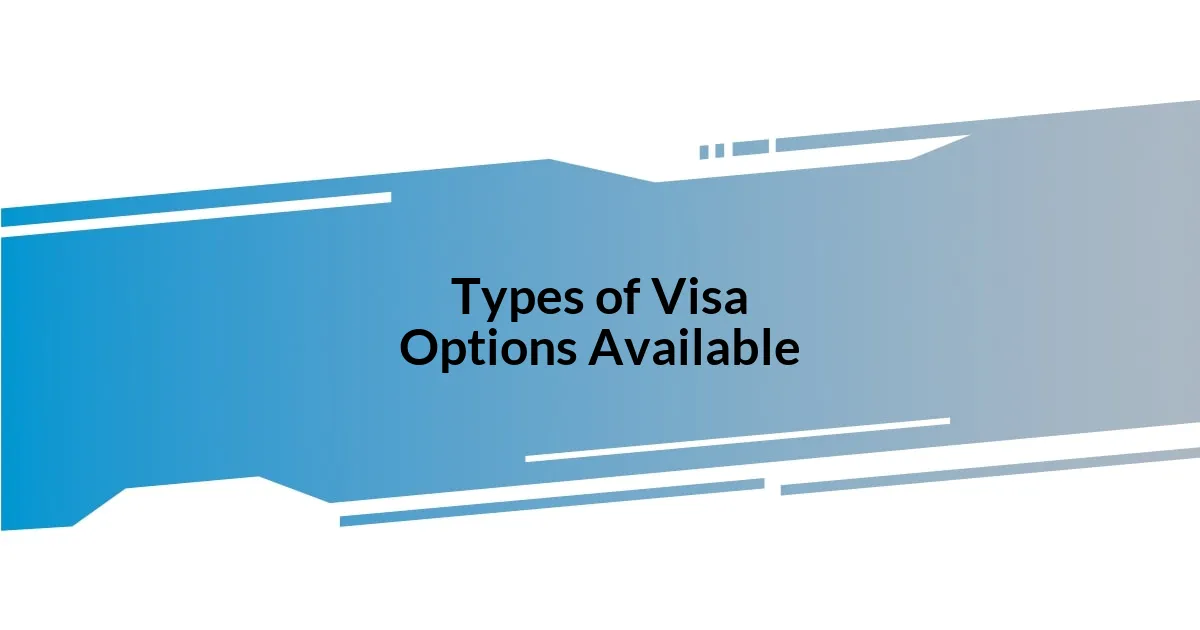
Types of Visa Options Available
There’s a fascinating array of visa types available, each catering to different needs and ambitions. I remember the first time I stumbled upon the various categories—I felt like an explorer in a vast, untouched land of possibilities. From family reunification to employment-based visas, the options can be both exciting and overwhelming.
Here’s a quick rundown of the most common visa options:
- Tourist Visas: Perfect for short trips and vacations, these allow for exploration but typically do not permit work.
- Student Visas: Designed for those seeking education abroad; they often come with conditions like enrollment in a specific institution.
- Work Visas: These can be employer-sponsored or based on skilled labor and typically require a job offer.
- Family Visas: These facilitate the reunion of close relatives, allowing families to live together across borders.
- Entrepreneur Visas: Ideal for individuals looking to start or invest in a business in a new country, showcasing a commitment to economic growth.
- Permanent Residency Visas: These are typically more complex, providing a pathway to live indefinitely in a country, often leading to citizenship.
I recall pouring over these categories late at night, days before my own visa application. It was a whirlwind of details, yet each little piece felt like a stepping stone toward a life I had dreamed of. The excitement I felt was palpable, underscoring the significance of choosing the right visa type for my future.
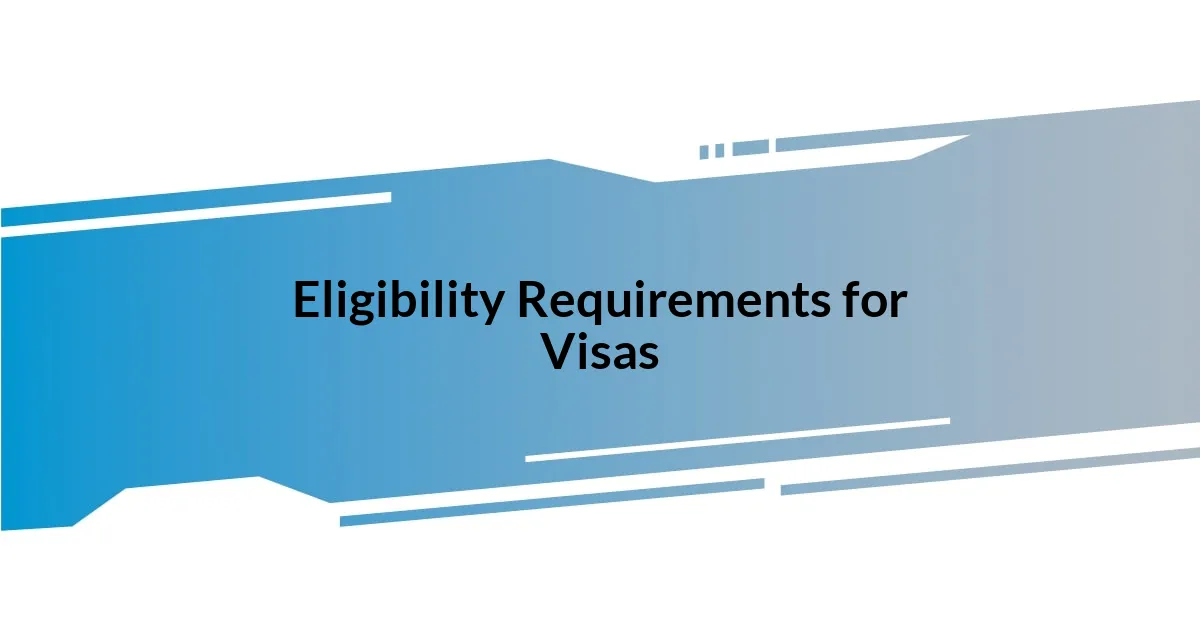
Eligibility Requirements for Visas
Navigating eligibility requirements for different visa types can be a maze, but I found it enlightening. Each visa has distinct criteria that often depend on factors like nationality, purpose of travel, and, importantly, personal circumstances. For instance, when I applied for a student visa, I had to prove my acceptance at a university and demonstrate that I could support myself financially while studying abroad. It really hit home how individual my journey was—my personal circumstances significantly shaped my eligibility.
To dive deeper into the intricacies, let’s look at how the requirements compare across various visa types. I was surprised to learn that even minor differences—like the need for sponsorship or specific documentation—can drastically affect one’s chances of approval. Reflecting on my experience, I remember frantically gathering documents for my work visa application, only to realize later that a single missing letter could have cost me the opportunity I had worked so hard for. That moment taught me the importance of meticulous attention to detail in visa applications.
It’s crucial to understand that eligibility isn’t just about satisfying bureaucratic demands; it’s also about unlocking potential. Think about it—different requirements reflect different intentions for each visa category. Here’s a handy comparison table that captures the essence of what makes each visa unique:
| Visa Type | Eligibility Requirements |
|---|---|
| Tourist Visa | Proof of sufficient funds, round-trip ticket, no work allowed |
| Student Visa | Acceptance letter, proof of funds, medical insurance |
| Work Visa | Job offer, sponsorship from employer, relevant qualifications |
| Family Visa | Proof of relationship, financial support evidence |
| Entrepreneur Visa | Business plan, investment funds, proof of economic impact |
| Permanent Residency Visa | Long-term residency application, employment history, background checks |
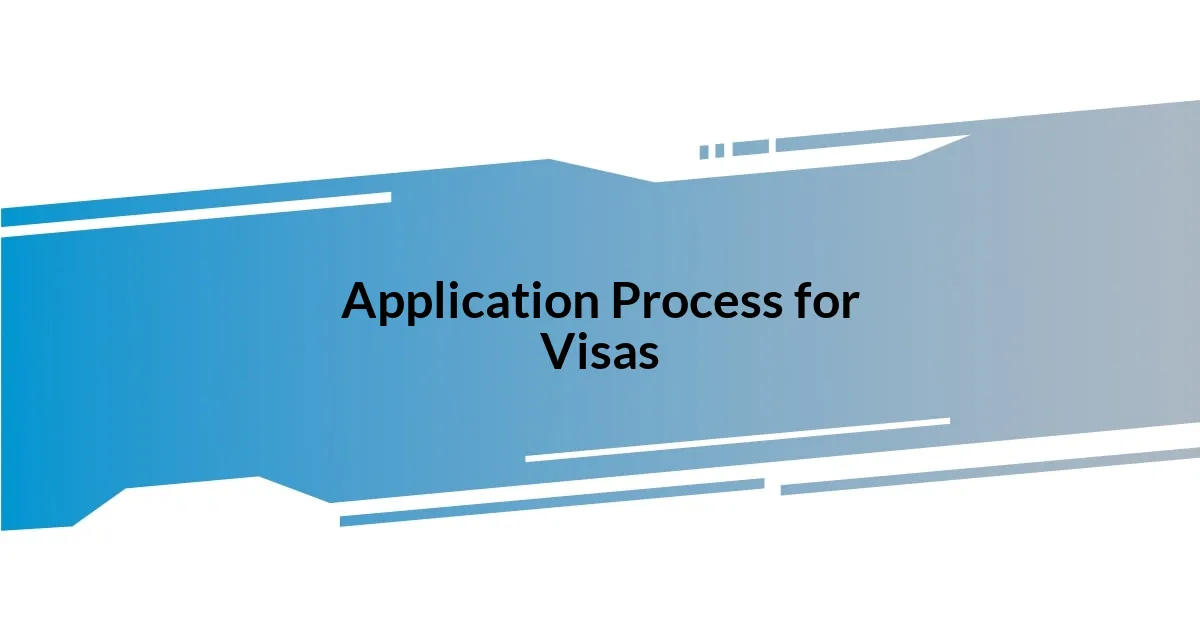
Application Process for Visas
The application process for visas often feels daunting, doesn’t it? I vividly remember the sense of anticipation as I meticulously collected each required document, like a puzzle slowly coming together. Each form felt like a step toward a dream, yet the weight of ensuring everything was correct added a fair share of anxiety. I often wondered, “What if I forgot something crucial?”
As I navigated through the application portals, I learned that organization is key. I created a checklist and color-coded my documents; it was a small trick that saved me from the chaos of last-minute searches. This became especially important when submitting my application, as I had a ticking clock reminding me of deadlines—an experience that both excited and terrified me. Have you ever felt the rush of adrenaline like that, where every detail mattered?
Once I finally submitted my application, I entered a waiting game that tested my patience. I couldn’t help but think about how much was riding on that outcome. It struck me that the entire process, while systematized, was deeply personal. Each applicant’s story is unique, and the emotions tied to visa applications can be intense. It’s not just about getting a stamp in your passport; it’s about realizing opportunities and the journeys that lie ahead.
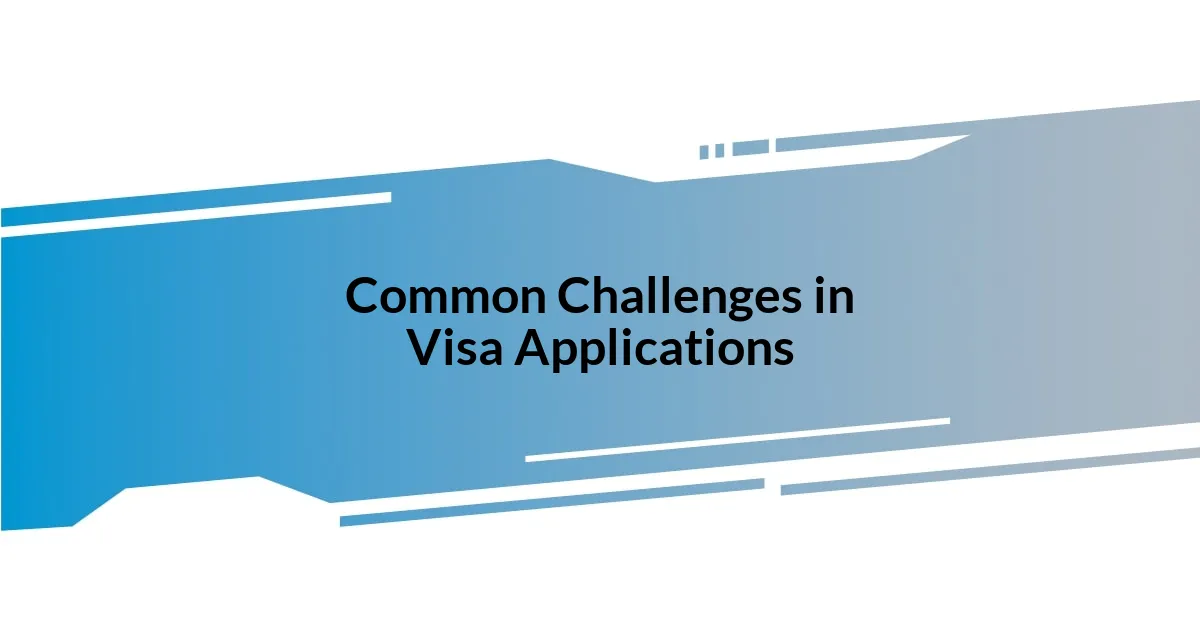
Common Challenges in Visa Applications
When it comes to visa applications, one common challenge is navigating the often overwhelming amount of paperwork. I recall sifting through stacks of forms and documentation for my residency application, feeling like I was buried in a sea of bureaucracy. Have you experienced the frustration of realizing you’re missing a crucial document just days before a deadline? That sinking feeling of panic can be all too familiar, as I learned firsthand how essential it is to keep everything organized and double-checked.
Another hurdle I encountered was dealing with inconsistent processing times. After submitting my application, I felt a rollercoaster of emotions with each passing day. The feeling of uncertainty was palpable; I remember staring at my email refresh button like it held the answers to my future plans. This inconsistency in timelines can really test one’s resolve. How do you stay motivated when the outcome is completely out of your hands? For me, focusing on other aspects of my life, like preparing for my move and researching my new city, helped manage the stress.
Lastly, one prevalent challenge is understanding the interview process, which can feel intimidating. I was nervous the first time I faced an immigration officer, knowing that my dreams hinged on those few moments. It wasn’t just about answering questions; it was about conveying my purpose and sincerity. I often thought, “What if I stutter or say something wrong?” It was a stark reminder that even after all the paperwork, the human elements of communication and authenticity are critical to success. How can we best prepare for something so unpredictable? For me, practice and role-playing with friends made a world of difference, helping to build my confidence.
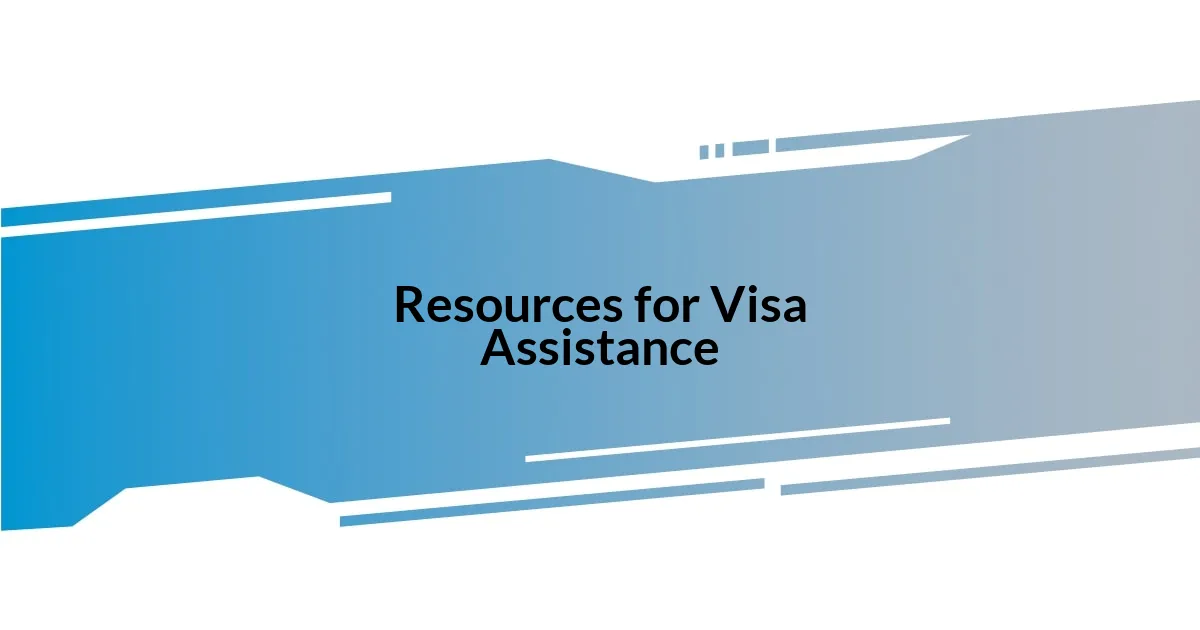
Resources for Visa Assistance
When seeking assistance with visa applications, I’ve often turned to online platforms that specialize in immigration advice. I remember stumbling across an online forum filled with other applicants who shared their stories and strategies, and it felt like a breath of fresh air. Have you ever found a community that resonates with your struggles? Engaging with people who understand the intricacies of the visa process not only provided me with valuable tips but also eased the anxiety, knowing I wasn’t alone in this journey.
Local immigration offices and community organizations can also be invaluable resources. I once attended a free workshop that walked participants through the application process. The counselors were so knowledgeable; their insights transformed how I viewed the paperwork. Do you realize how much difference it makes to have an expert clarify your doubts? That session empowered me with the confidence to tackle my application head-on, and I often recommend such resources to friends who are starting their own visa journeys.
Lastly, don’t overlook the power of official government websites. I remember scouring the USCIS website for information regarding my specific visa type, which was both intimidating and enlightening. It was challenging to navigate at first, but I found sections that answered my most pressing questions. Why do we sometimes ignore official sources in favor of hearsay? I learned that taking the time to read through the guidelines provided clarity and saved me from potential missteps in my application. Reliable resources truly are the backbone of a successful visa application process!